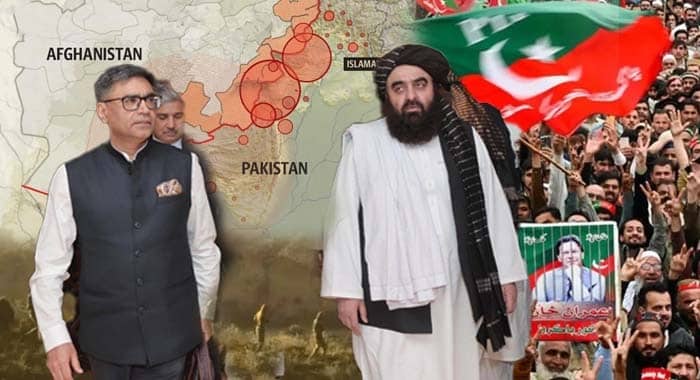Muhammad Haseenullah
In a time when Pakistan stands dangerously wedged between two hostile neighbours; its arch-rival India on the east and the increasingly belligerent Afghan Taliban on the west, the country needs unity more than ever. Instead, what we are witnessing is the Pakistan Tehreek-e-Insaf (PTI), once again, prioritising petty political ambitions over national interest.
With border tensions flaring on the Afghan frontier and India seizing every opportunity to isolate Pakistan diplomatically, this is not the moment for division. And yet, PTI, a party whose founder is infamously dubbed “Taliban Khan” on the international stage, continues to play the same destabilising card: demanding the release of Imran Khan, ignoring the gravity of his legal cases, and holding the national discourse hostage to a single-point agenda.
Imran Khan is not a political martyr, he is facing the consequences of actions committed during his tenure. In fact, one might say he is finally getting a taste of the very medicine he once dished out to his opponents. But instead of introspection, the PTI machinery remains fixated on his release, pushing the party to peddle narratives that can only benefit Pakistan’s adversaries.
This is especially alarming at a time when Afghanistan, once seen as a strategic depth for Pakistan, has turned hostile. The Afghan Taliban, nurtured for decades by Pakistan’s strategic community, are now plying the role of Frankenstein’s monster. In an ironic twist of betrayal, Afghan officials like Amir Muttaqi are now cozying up to India, issuing anti-Pakistan statements directly from Delhi. India, the same country that did everything in its power to dismantle the Taliban regime in the early 2000s, now appears to be their new “strategic partner.”
On the western front, Pakistani troops are engaged in dangerous border skirmishes with the Taliban. Our soldiers are defending every inch of the motherland against unjust aggression. And what do we see from PTI leaders? Statements that can only be described as tone-deaf, misguided, and ultimately harmful.
Salman Akram Raja, PTI’s Secretary General, recently remarked that peace with Afghanistan is impossible without dialogue and that we cannot afford to seal our borders due to economic dependencies. While diplomatic engagement is important, the timing and tone of such statements betray a dangerous naiveté; or worse, a calculated distraction from internal party turmoil and Imran Khan’s ongoing legal troubles.
Shahid Khattak, another PTI figure, echoed similar sentiments on a talk show, calling for a tribal delegation to negotiate with the Afghan side. This might appear reasonable on the surface, but as Prime Minister’s advisor Amir Muqam rightly pointed out, if provincial entities begin negotiating directly with foreign powers, what remains of the federal government’s authority?
What Pakistan needs now is a strong, united front. The military, civil institutions, and political parties must stand together against external threats. Instead, PTI is busy undermining this unity from within, disregarding the national security landscape just to score political points.
In a region where the diplomatic chessboard is being rapidly redrawn, internal discord is the greatest gift we can give our enemies. A divided Pakistan sends the wrong message to the global community, that at our most vulnerable, we are too busy fighting among ourselves to defend our borders or maintain national dignity.
At a time when unity is not just desirable, but existential, PTI’s opportunism is not only irresponsible — it’s dangerous. Worse still is a grim symmetry: PTI has long displayed a soft corner for the Pakistani Taliban (the banned TTP), facilitating their return and resettlement in Khyber Pakhtunkhwa and the tribal districts, a boast “Taliban Khan” (Imran Khan) has at times worn like a badge of honour. Meanwhile, the Afghan Taliban have been sheltering and harboring those same elements, and may now be using them against Pakistan from Afghan soil. In short, a divided political front and reckless nostalgia for militant ties hand our enemies both the oxygen and the opportunity they need.





